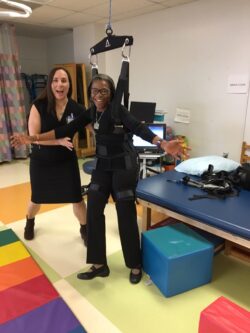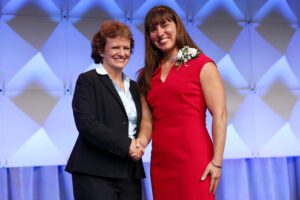Exploring Infant Neuromotor Development: An Interview with Beth Smith
 Meet Beth Smith, PT, DPT, PhD, the director of the Infant Neuromotor Control Laboratory at Children’s Hospital Los Angeles. She is the recipient of the Foundation for Physical Therapy Research 2011 New Investigator Fellowship Training Initiative (NIFTI), followed by the Foundation’s Pediatric Research Grant in 2016.
Meet Beth Smith, PT, DPT, PhD, the director of the Infant Neuromotor Control Laboratory at Children’s Hospital Los Angeles. She is the recipient of the Foundation for Physical Therapy Research 2011 New Investigator Fellowship Training Initiative (NIFTI), followed by the Foundation’s Pediatric Research Grant in 2016.
Her research centers on examining movement patterns as indicators of the developing central nervous system, facilitating early identification of whether an infant is following a typical or atypical developmental trajectory. Following this identification, the question arises: What should the intervention entail in terms of the amount and type of movement practice necessary for achieving milestones, such as reaching, crawling, and walking?
Tell us briefly about your current research project.
As the director of the Infant Neuromotor Control Laboratory at Children’s Hospital Los Angeles, I lead research aimed at understanding the links between early brain development, infant movement behavior, and neurodevelopmental outcomes. Our work involves comprehensive assessments of infant neuromotor behavior, enabling us to accurately identify atypical developmental trajectories and implement targeted interventions.
Our current projects include monitoring longitudinal changes in leg and arm movement patterns in infants with typical development and those at risk of neurodevelopmental disabilities, such as cerebral palsy. We utilize wearable sensors, smartphones, electroencephalography (EEG), and eye gaze tracking in novel and complementary ways to capture and assess complex infant behaviors. Through innovative technology and research methods, we strive to enhance early intervention strategies and improve outcomes for infants at risk of developmental disorders.
What role has the Foundation played in your research journey?
Receiving the NIFTI fellowship during my post-doctoral tenure, followed by securing the Pediatric Research Grant as an early career faculty member, has been instrumental in launching my research career. The fellowship and grant played a fundamental role in laying the groundwork for my journey in academia and research. During my postdoc while applying for the NIFTI, I gained valuable grant writing experience and received mentorship from my postdoctoral mentor. Both experiences enabled me to gather essential pilot data crucial for future larger Federal grant proposals, underscoring their instrumental role in establishing my research career.
How do you envision your research being implemented in practice?
Ultimately, I envision clinicians integrating wearable sensors and metrics into their assessment of young infants. This advanced approach aims to identify those in need of early intervention at a very early stage. Furthermore, these assessments will inform the content of early interventions tailored to each child’s needs.
Historically, infant evaluation and assessment have relied heavily on subjective observations of behavior in clinical settings. In contrast, our work emphasizes the use of quantitative tools such as EEG, eye tracking, and wearable sensors. By measuring infant behavior in objective and quantifiable ways, we aim to achieve more sensitive and accurate assessments. This shift towards objective measurement methods has the potential to revolutionize early intervention strategies for infants.
What has been your biggest lesson during your current research project?
Upon receiving a grant, there’s an inherent commitment to deliver the promised work within the designated timeline and budget. However, unforeseen obstacles inevitably arise. For instance, despite efforts to hire and train staff members, unforeseen personal circumstances may necessitate their departure, posing an institutional challenge compounded by the time-consuming process of finding replacements. This can lead to periods of understaffing that strain project continuity. Moreover, unexpected expenses, such as equipment failures beyond warranty coverage, present additional hurdles. Addressing these issues demands quick thinking and creative solutions, often involving reallocating funds from other budget areas. These examples underscore the intricate nature of grant management, highlighting the importance of adaptability and resilience in navigating unforeseen challenges.
Any advice for budding researchers?
I believe there are two key traits essential to success: passion and perseverance. Passion is what drives us each morning, igniting our motivation for the work we do. On the other hand, perseverance is what sustains us over the long term, especially in the face of rejection and challenges inherent in research.

In the realm of academia and research, rejection is commonplace. Grants are frequently declined, and papers often face rejection before publication. As such, perseverance is crucial in overcoming setbacks and pushing forward. However, passion is equally vital. Without genuine enthusiasm for our work, it’s challenging to maintain the resilience needed to weather the obstacles that come our way. For me, my passion fuels my daily motivation and enthusiasm for my work. It’s what propels me to embark on each day’s tasks with zeal. Yet, it’s perseverance that enables me to navigate the long and arduous research journey. Research is a slow process, marked by numerous steps and challenges along the way. Having the vision to see beyond immediate setbacks and the determination to press on despite them is essential.
Despite the trials and rejections, there are countless moments of joy and fulfillment in my work. Interacting with infants and their families, witnessing their growth and development, is incredibly rewarding. Additionally, seeing my trainees evolve and succeed in their own endeavors brings me immense satisfaction.

Beth Smith, PT, DPT, PhD
STAY CONNECTED
Use this form to sign up for the Foundation for Physical Therapy Research monthly newsletter.